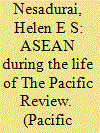| Srl | Item |
| 1 |
ID:
155097


|
|
|
|
|
| Summary/Abstract |
Recent studies of ASEAN have focused on why ASEAN community building has emphasised liberal norms such as human rights, democracy promotion and a commitment to wider participation while maintaining a set of sovereignty-preserving regional principles – the ASEAN Way norms – that have been more suited to securing illiberal agendas and the authoritarian practices of state elites. ASEAN's seeming progressive turn is argued to be instrumentally aimed at buttressing the legitimacy of the grouping as a credible regional institution in international society in which these norms are widely accepted though not uncontested. With recent developments suggesting further consolidation of, or a return to, authoritarian tendencies across the region, state-based modes of governance may become more limited in terms of what ASEAN member states are prepared to endorse. It is, therefore, time for scholars to expand analysis to explore how transnational issues and problems may be functionally governed outside of formal regional institutions involving non-state actors in key roles. While the turn to privately generated standards, rules and practices in global governance is well-recognised and researched, the disparate studies on private governance in South-East Asia are rarely cumulated into a more coherent research programme that addresses the effectiveness of private governance as well as its normative implications. These questions point to a promising agenda for research on regional and other transnational modes of governance in South-East Asia.
|
|
|
|
|
|
|
|
|
|
|
|
|
|
|
|
| 2 |
ID:
154932


|
|
|
|
|
| Summary/Abstract |
Turkey’s accession to the European Union (EU) is one of the most controversial cases in its enlargement policy. Both external and domestic factors complicate its accession, bringing forth questions on geographical, cultural borders of Europe as well as the limits of EU’s institutional capacity. While Turkey’s accession seems to be farther away, it is, nonetheless, functionally integrated to the EU in multiple ways, ranging from trade, common foreign and security policy, justice and home affairs to energy cooperation. It is, therefore, critical to assess whether alternative modes of integration are possible for Turkish–EU relations, going beyond formal membership. To do so, the paper draws upon the in-depth interviews conducted with Turkish and EU officials in 2013, 2015 and 2016. The paper evaluates the degree of differentiated integration between Turkey and the EU, and assesses the trajectory of this functional integration in related policy areas and proposes multiple new avenues to further this cooperation.
|
|
|
|
|
|
|
|
|
|
|
|
|
|
|
|